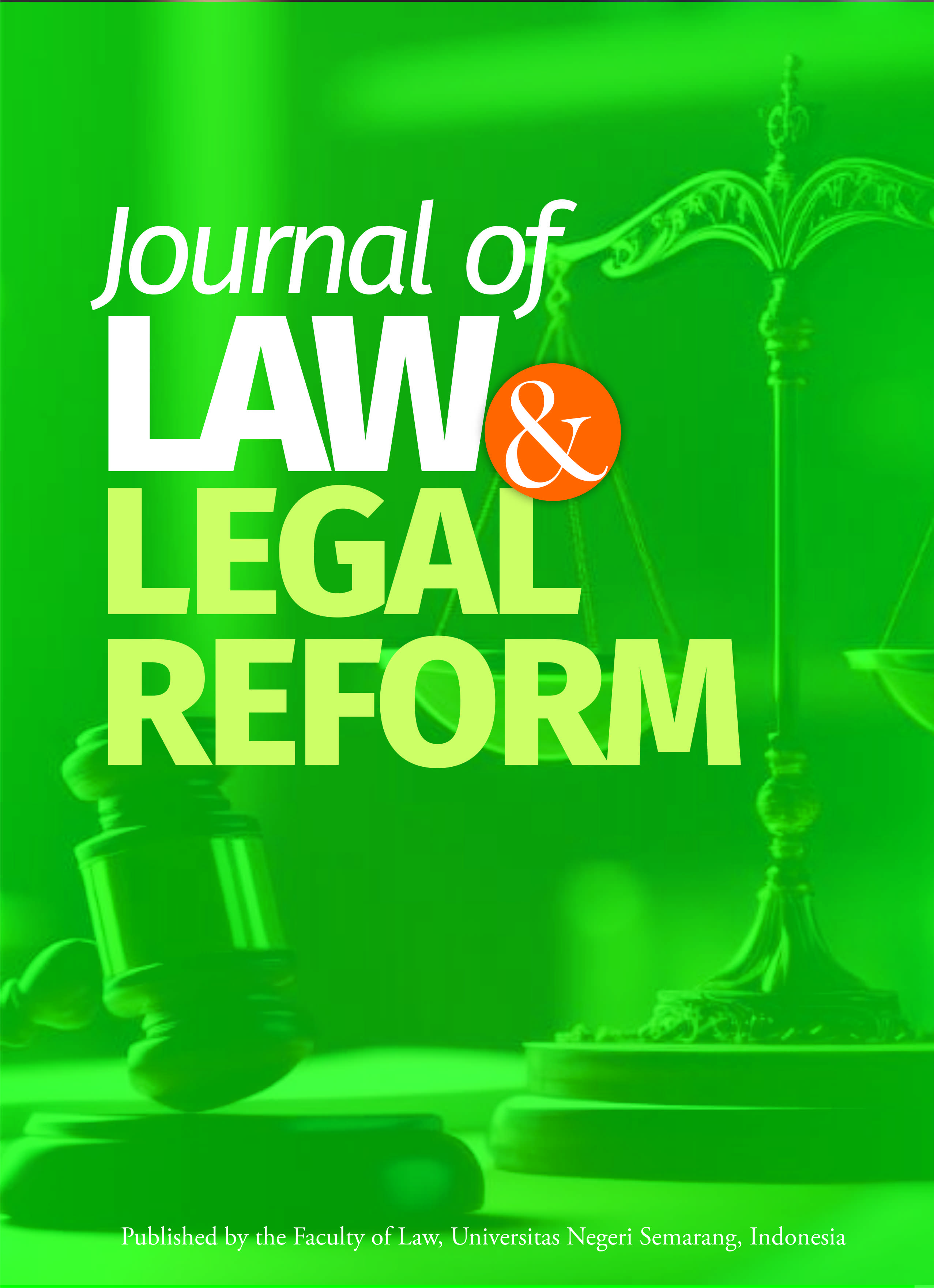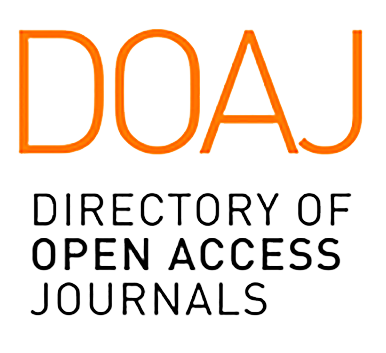Urgency Supreme Court Circular Letter Number 2 of 2023 in the Judicial Process of Interfaith Marriage Registration
DOI:
https://doi.org/10.15294/jllr.vol5i1.2101Keywords:
Marriage, Interfaith, Circular Letters, AuthorityAbstract
The Supreme Court of the Republic of Indonesia has issued Circular Letter Number 2 of 2023, stipulating that courts are not permitted to approve requests for the registration of interfaith marriages. However, it is crucial to highlight the principle that Indonesian judges must exercise their duties independently, devoid of external interference. Judges are expected to uphold qualities of independence, impartiality, fairness, and responsibility, refraining from influencing the provision of material to litigants to prevent moral distortion. This article aims to elucidate the role of the aforementioned circular letter concerning the judge's independence within the judicial process in Indonesia. The research methodology employed involves normative legal methods, coupled with a structured analysis of legal norms and principles. The findings of the research underscore two key points. Firstly, the urgency of regulating the determination of marriages involving different religions and beliefs in the judicial process is rooted in the objective of aligning court resolutions with the philosophical underpinnings of the Indonesian nation. Secondly, it is emphasized that the Circular Letter in question does not hold binding authority for judges in the adjudication of cases, particularly those involving interfaith marriages. The autonomy of judicial power, as enshrined in the 1945 Constitution of the Republic of Indonesia and further detailed in Law Number 48 of 2009 concerning Judicial Power, affords judges the freedom to independently decide on cases brought before them. This regulatory framework underscores the imperative of preserving the unfettered discretion of judges in their adjudicative functions.
References
Adams, Wahidudin. Penguatan Integrasi Perda Dalam Kesatuan Sistem Hukum Nasional. Jakarta: Badan Pembinaan Hukum Nasional, 2010.
Amdi Pune, Elsa Rina Maya, Erwin Ubwarin. “Kebebasan Hakim Dalam Penjatuhan Pidana Korupsi Dikaitkan Dengan Surat Edaran Mahkamah Agung Nomor 3 Tahun 2018.” Tatohi Jurnal Ilmu Hukum 1 (2021): 694.
Ardhanariswari, Riris, Eko Nursetiawan, Syarafina Dyah Amalia, Enny Dwi Cahyani, dan Rozlinda Mohamed Fadzil. “Upholding Judicial Independence through the Practice of Judicial Activism in Constitutional Review: A Study by Constitutional Judges.” Volksgeist: Jurnal Ilmu Hukum dan Konstitusi 6, no. 2 (2023): 183–207. https://doi.org/10.24090/volksgeist.v6i2.9565.
Ash, Elliott, dan W. Bentley MacLeod. “Reducing partisanship in judicial elections can improve judge quality: Evidence from U.S. state supreme courts.” Journal of Public Economics 201 (2021): 104478. https://doi.org/10.1016/j.jpubeco.2021.104478.
Awusi, Mary, David Addae, dan Olivia Adwoa Tiwaa Frimpong Kwapong. “Tackling the legislative underrepresentation of women in Ghana: Empowerment strategies for broader gender parity.” Social Sciences and Humanities Open 8, no. 1 (2023): 100717. https://doi.org/10.1016/j.ssaho.2023.100717.
Bakri, Fadhila Restyana Larasati dan Mochammad. “Implementasi Surat Edaran Mahkamah Agung Nomor 4 Tahun 2016 pada Putusan Hakim dalam Pemberian Perlindungan Hukum bagi Pembeli Beritikad Baik.” Jurnal Konstitusi 15, no. 4 (2019). https://doi.org/https://doi.org/10.31078/jk15410.
Basah, Sjachran. Eksistensi dan tolak Ukur Badan Peradilan Administrasi Negara di Indonesia. Bandung, 1985.
C, Irwan Adi. Perlindungan Hukum Dalam SEMA Nomor 4 Tahun 2011 Tentang Perlakuan Terhadap Pelapor Tindak Pidana (Whistle Blower) Dan Saksi Pelaku Yang Bekerjasama (Justice Collaborator) Di Dalam Perkara Tindak Pidana Tertentu. Malang, 2013.
Dahlan Thaib. Implementasi Sistem Ketatanegaraan Menurut UUD 1945. Yogyakarta: Liberty, 1988.
Disantara, Fradhana Putra. “The Legitimacy of Circular Letter in Handling COVID-19 Pandemic.” Encyclopedia of Quaternary Science: Second Edition, 2020, 531–36. https://doi.org/10.1016/B978-0-444-53643-3.00164-3.
Elisabeth N B. “Sistem Peradilan Satu Atap dan Perwujudan Negara Hukum Menurut UU No 4 Tahun 2004.” Mimbar Hukum 22, no. 1 (2010): 188-200.
Gersdorf, Małgorzata, dan Mateusz Pilich. “Judges and Representatives of the People: A Polish Perspective.” European Constitutional Law Review 16, no. 3 (2020): 345–78. https://doi.org/10.1017/S1574019620000206.
Gonadi, Aurora Vania Crisdi, dan Gunawan Djajaputra. “Analisis Perspektif Pro Kontra Masyarakat Terhadap Penerapan Sema No. 2 Tahun 2023.” UNES Law Review 6, no. 1 (2023): 2974–88. https://review-unes.com/index.php/law/article/view/1072.
Hadi, Farina Gandrayani Fikri. “Kegagalan Peraturan Penanganan Covid-19 di Indonesia.” Jurnal Konstitusi 19, no. 1 (2022): 23-46.
Hadjon, Philipus M. Pengantar Hukum Administrasi Indonesia. Gadjah Mada University Pers, 2005.
HR, Ridwan. Hukum Administrasi Negara. Yogyakarta: UII Press, 2002.
Husen, La Ode. Negara Hukum, Demokrasi dan Pemisahan Kekuasaan. Makassar: PT. Umitoha Ukhuwah Grafika, 2009.
Indroharto. Usaha Memahami Undang-Undang Tentang Peradilan Tata Usaha Negara. Jakarta: Pustaka Sinar Harapan, 2003.
Julio, Alfaro, dan Antonio Sepang. “Perkawinan Beda Agama Ditinjau Dari Hukum Positif Dan Hukum Kanonik Di Indonesia,” Lex Privatum 13, no. 2 (2024).
Karsayuda, M. Perkawinan Beda Agama. Yogyakarta: Total Media, 2006.
Kelsen, Hans. General Theory of Law and State. New York, 1945.
Kreveld, J.H. van. Beleidsregel in het Recht, n.d.
Kriyantono, Rachmat, Rachmah Ida, George Towar Ikbal Tawakkal, dan Reza Safitri. “Not just about representative: When democracy needs females and their competency to run Indonesian government public relations to management level.” Heliyon 8, no. 1 (2022). https://doi.org/10.1016/j.heliyon.2022.e08714.
Kurttekin, Fatma. “Religious education of children in interfaith marriages.” Journal of Beliefs and Values 41, no. 3 (2020): 272–83. https://doi.org/10.1080/13617672.2019.1624938.
Kusumo, Dewoto, dan Rifki Afandi. “Religious Marriage in Indonesia in the Perspective of Islamic Law and Positive Law in Indonesia : Legal Comlexities and the Issuance of Supreme Court Circular Letter No. 2 of 2023.” Indonesian Journal of Innovation Studies 13 (2020): 1–12. https://doi.org/10.21070/ijins.v25i.975.
Lambais, Guilherme, dan Henrik Sigstad. “Judicial subversion: The effects of political power on court outcomes.” Journal of Public Economics 217 (2023): 104788. https://doi.org/10.1016/j.jpubeco.2022.104788.
Lestari, Endriyani. “Kualifikasi Negarawan sebagai Independensi Hakim Mahkamah Konstitusi di Indonesia.” Jurnal Rechten: Riset Hukum dan Hak Asasi Manusia 5 (2023).
Lukman, Marcus. Eksistensi Peraturan Kebijaksanaan dalam Bidang Perencanaan dan Pelaksanaan Rencana Pembangunan di daerah serta Dampaknya terhadap Pembangunan Materi Hukum Tertulis Nasional. Universitas Padjajaran, 1996.
Lumbuun, Ronald S. PERMA RI (Peraturan Makamah Agung Republik Indonesia): Wujud Kerancuan antara Praktik Pembangian dan Pemisahaan Kekuasaan. Jakarta: PT. Raja Grafindo Persada, 2011.
Mahy, Petra. “Indonesia’s Omnibus Law on Job Creation: Legal Hierarchy and Responses to Judicial Review in the Labour Cluster of Amendments.” Asian Journal of Comparative Law 17, no. 1 (2022): 51–75. https://doi.org/10.1017/asjcl.2022.7.
Manan, Bagir. Peraturan Kebijaksanaan. Jakarta, 1994.
Marzuki, Peter Mahmud. Pengantar Ilmu Hukum. Prenada Media, 2009.
Miao, Senlin, Gary Gang Tian, Fenghua Wen, dan Jinli Xiao. “The Independence of Judges and Corporate Social Responsibility.” Journal of Business Ethics, no. 0123456789 (2023). https://doi.org/10.1007/s10551-023-05540-8.
Munir, Bakht, Zaheer Iqbal Cheema, dan Jawwad Riaz. “Separation of Powers and System of Checks and Balances: A Debate on the Functionalist and Formalist Theories in the Context of Pakistan.” Global Political Review V, no. III (2020): 11–23. https://doi.org/10.31703/gpr.2020(v-iii).02.
N. Idan, Majid., dan Mohammed. S. Saber. “Role of the Federal Supreme Court In Maintaining the Independence of the Judiciary’Mustal’.” Journal of College of Law for Legal and Political Sciences 8, no. issue 30 part 1 (2022): 264–97. https://jclaps.uokirkuk.edu.iq/article_173876.html.
Nasir, Mohamad Abdun. “Religion, Law, and Identity: Contending Authorities on Interfaith Marriage in Lombok, Indonesia.” Islam and Christian-Muslim Relations 31, no. 2 (2020): 131–50. https://doi.org/10.1080/09596410.2020.1773618.
Ningrat, Muhammad Afdhol Kusuma, et al. "Exploring Supreme Court Circular No. 2 of 2023's Impact on Interfaith Marriages: A Maqashid Syariah Perspective." ALFIQH Islamic Law Review Journal 3, no.1 (2024): 26-40.
Pakaya, Salahudin. “Political Law Regulation of Judicial Institutions in Exercising the Powers of an Independent Judgment: Before and After Amendments to the 1945 Constitution.” International Journal Papier Public Review 1, no. 2 (2020): 119–28. https://doi.org/10.47667/ijppr.v1i2.91.
Razak, Abd Rahman, dan Qadir Gassing. “Effectiveness of SEMA No. 2 of 2023 Regarding Interfaith Marriage in Indonesia 2024". Madani: Jurnal Ilmiah Multidisipline 2, no. 1 (2024): 417–23.
Richards, Mark J, and Herbert M Kritzer. “Jurisprudential Regimes in Supreme Court Decision Making.” American Political Science Review 96, no. 2 (2002): 305–320. https://doi.org/10.1017/S0003055402000187.
Ridwan, HR. Hukum Administrasi Negara. Jakarta: Raja Grafindo Persada, 2008.
Rihdo, Maulana, Al Fasil, Ishaq Maulana Sudur, Ahsandy Ramadhan Suardi, Satriya Pamungkas, dan Fauziyah Putri Meilinda. “Kedudukan Surat Edaran Mahkamah Agung (Sema) Dalam Perspektif Akademisi : Kekuatan Hukum , Ketetapan Dan Konsistensi , Pengaruh Terhadap Putusan Hukum.” USRAH: Jurnal Hukum Keluarga Islam 4, no. 2 (2023): 230–40.
Redi, Ahmad. Hukum Pembentukan Peraturan Perundang-Undangan. Sinar Grafika, 2021.
Republic of Indonesia. Surat Edaran Mahkamah Agung No 2 Tahun 2023 (2023).
Republic of Indonesia. Undang - Undang Dasar 1945 (1945).
Republic of Indonesia. Undang Undang Nomor 48 Tahun 2009 (2009).
Republic of Indonesia. Undang-Undang No 1 Tahun 1950
Ros, Luciano Da, dan Matthew M. Taylor. “Checks and balances: The concept and its implications for corruption.” Revista Direito GV 17, no. 2 (2021): 1–30. https://doi.org/10.1590/2317-6172202120.
Ruhenda, Ruhenda, Heldi Heldi, Hasan Mustapa, dan Muhammad Andi Septiadi. “Tinjauan Trias Politika Terhadap Terbentuknya Sistem Politik dan Pemerintahan di Indonesia.” Journal of Governance and Social Policy 1, no. 2 (2020): 58–69. https://doi.org/10.24815/gaspol.v1i2.18221.
Sagum, Ria Ambrocio, Patrick Anndwin C Clacio, Rey Edison R Cayetano, F C Dale, dan Airis Dale F Lobrio. “ScienceDirect ScienceDirect Philippine Court Case Summarizer using Latent Semantic Philippine Court Case Summarizer Analysis using Latent Semantic Analysis.” Procedia Computer Science 227 (2023): 474–81. https://doi.org/10.1016/j.procs.2023.10.548.
Saputri, Atha Difa, and Ricky Julianto. "Comparative Justice Accountability of Samen Leven Actors in Indonesia and Malaysia." Contemporary Issues on Interfaith Law and Society 2.2 (2023): 131-160.
Setiawan, Dani. "Inter-religious marriage: A controversial issue in Indonesia." Contemporary Issues on Interfaith Law and Society 1, no.1 (2022): 23-38.
Sibuea, Hotma P. Asas-asas Negara Hukum, Peraturan Kebijakan dan Asas-asas Umum Pemerintahan yang Baik. Jakarta: Erlangga, 2010.
Subarkah, Ibnu, I Nyoman Nurjaya, Bambang Sugiri, dan Mascruchin Ruba. “International Journal of Multicultural and Multireligious Understanding The Obscurity of Judicial Independence towards Regulations with Legal Certainty in Indonesia,” 2021, 472–85.
Suntana, Ija, Iu Rusliana, Chay Asdak, dan Lubna Gazalba. “Ideological distrust: re-understanding the debate on state ideology, normalization of state-religion relationship, and legal system in Indonesia.” Heliyon 9, no. 3 (2023): e14676. https://doi.org/10.1016/j.heliyon.2023.e14676.
Suparto, dan Zulkifli. “Position of Circular Letter of the Supreme Court As a Follow-Up From the Decision of the Constitutional Court Number 37/Puu-Ix/2011.” Awang Long Law Review 5, no. 1 (2022): 225–34. https://doi.org/10.56301/awl.v5i1.554.
Undang-undang (UU) Nomor 3 Tahun 2009 tentang Perubahan Kedua Atas Undang-Undang Nomor 14 Tahun 1985 tentang Mahkamah Agung (2009).
Undang-Undang Nomor 48 Tahun 2009 tentang Kekuasaan Kehakiman (2009).
Wijatmoko, Erlan, Armaidy Armawi, dan Teuku Faisal Fathani. “Legal effectiveness in promoting development policies: A case study of North Aceh Indonesia.” Heliyon 9, no. 11 (2023): e21280. https://doi.org/10.1016/j.heliyon.2023.e21280.
Yaron Zelekha, Gil Avnimelech. “Cultural and personal channels between religion, religiosity, and corruption.” Heliyon 9 (2023): 1.
Zubaedi. Filsafat Barat: Dari Logika Baru rene Descartes Hingga Revolusi Sains Ala Thomas Khun. Diedit oleh Ilyya Muhsin. Yogyakarta: Ar-Ruzz Media, 2007.
Downloads
Published
Article ID
2101Issue
Section
License

This work is licensed under a Creative Commons Attribution-NonCommercial-ShareAlike 4.0 International License.
All writings published in this journal are personal views of the authors and do not represent the views of this journal and the author's affiliated institutions. Author(s) retain copyrights under a Creative Commons Attribution-NonCommercial-ShareAlike 4.0 International (CC BY-NC-SA 4.0).









